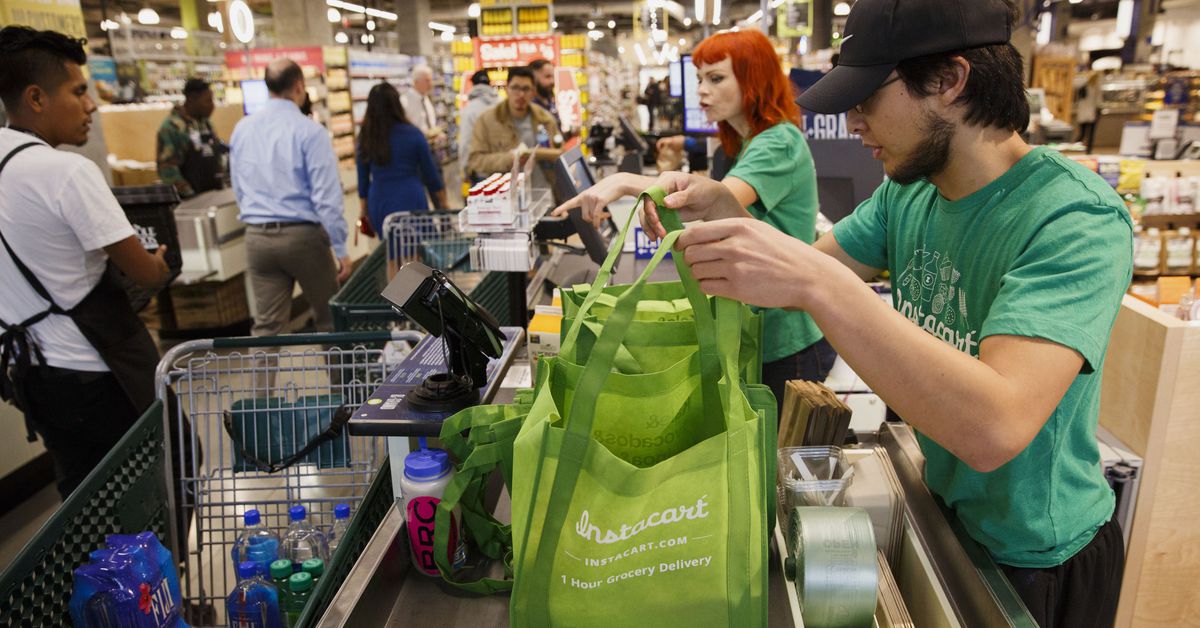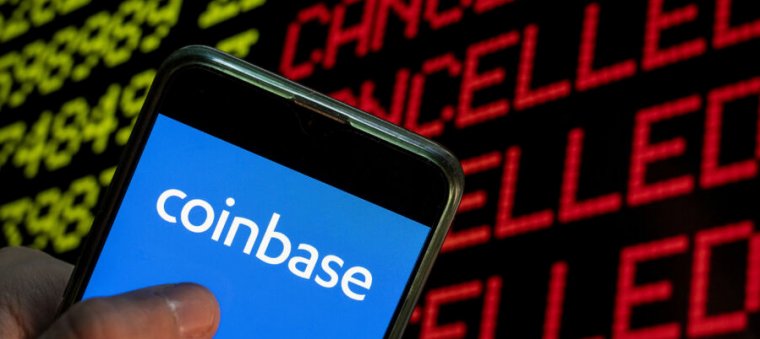
It was the last job of the night. At 9 o’clock in New York City, my Instacart Shopper app alerted my phone: an order for a store in Brooklyn with delivery to Manhattan. I was exhausted from a long day of shopping and delivering 24-packs of Poland Spring bottles and gallons of milk jugs, but I decided to chase the extra $30 and deliver to Jill on the Upper West Side. [Author’s note: Details have been changed to protect her privacy.]
The order was typical, but there were several out-of-stock items given the time of day, which I messaged Jill about through the app to no response. Hoping for the best, I dropped off the order. To my chagrin, the next morning a four-star rating appeared on my phone, which in the world of Instacart shoppers meant that I was effectively facing a massive pay cut.
Instacart does not give us insight into whom our low ratings come from, only a dose of paranoia and anxiety to figure it out and save our income. So, out of desperation and a sense — given my deliveries of the day before — that Jill was the rater in question, I drafted her a letter explaining how, thanks to Instacart’s ratings system, a rating like hers can destroy a shopper’s livelihood.
For a minute, I thought about dropping it off at her apartment, but then reality sunk in. Such a letter might appear extreme, accusatory, or aggressive, as well as make matters worse. I didn’t even know whether Jill was actually the customer who rated me. At the same time, the repercussions of four-star ratings have left me with little choice but to tell others about what it’s like on my side of the app.
I have been shopping for Instacart for eight months and usually work 40 hours per week to meet my expenses. As a commission gig, it felt like an opportunity to make more money than an hourly wage entry-level job in the entertainment industry, where I am pursuing a career. Yet relying on the app for income has illuminated to me the divisiveness of platforms that facilitate services such as Instacart. As a shopper, I believe the app perniciously prevents genuine communication between the two parties using it, while arming one with the capacity to truly punish the other in a way my customers might never know.
Instacart is a third-party app, similar to Uber or Airbnb but for grocery delivery. Just like other gig economy platforms, the app has two sets of users: those who order groceries and those who shop and deliver them. What transpires between shoppers and customers feeds on a precarious ratings system where a shopper’s wages tremble on a razor-thin margin of error. Someone in college with a 3.9 GPA would be considered an exceptional student, and an Uber driver with a 4.8-star rating is a trusty motorist, but an Instacart shopper whose rating falls to even 4.96 out of five stars could struggle to pay rent for the next month or even two.
The way Instacart works is this: A handful of orders appear on the shopper dashboard, and shoppers choose which orders they wish to fulfill, typically by how much pay the order promises. However, shoppers with higher customer ratings get first pick — the higher-paying orders. Even though shoppers in the, let’s say, 4.9- to five-star range provide virtually the same quality service, those even slightly below a perfect five-star rating can slip to orders that pay significantly differently.
Although Instacart automatically drops the lowest rating, I know that just one additional rating still has an impact: When I received a four-star rating after dozens of five-star ratings, my average dropped to 4.96. With it, my newly limited batches shrank my average earnings from $25 per hour to much lower, likely below New York’s $15 minimum wage. I became a bottom feeder, seemingly receiving the leftover orders that, by other shoppers’ definition, paid an amount that was not worth accepting.
For many, the urge to rate a delivery service four stars or lower makes sense on the surface. If the service did not deliver on its promise, the customer has the right to report and penalize this service — or, in this case, the worker.
A ratings system allows customers to feel safe using the service, filtering out any untrustworthy employees from handling your personal tasks. However, minor mistakes on several orders that might warrant a stern talk from a manager should not be enough to slash a worker’s wages. In my experience, however, this has been the case when receiving anything less than a five-star rating as an Instacart shopper.
For me, and for so many of the other shoppers I’ve talked to, a five-star rating versus a 4.96-star rating could mean the difference between a shopper who can pay the bills and one who cannot. That this might not even reflect the quality of their shopping but merely the bad luck of serving a punitive customer seems unjust. Shoppers should not have to live in financial and mental paranoia that one or two customers will demolish their income, livelihood, and family security with the swipe of a finger.
Ultimately, though, most customers aren’t aware of how harmful the ratings system can be. It is Instacart’s responsibility — and the responsibility of the many tech companies that pit workers against each other for profitability.
Though Instacart’s ratings system can lead to particularly perverse outcomes, it is indicative of a larger problem. Communicating through these apps on our devices, especially in a transactional way, will always put workers at the mercy of tech corporations, with little tolerance for small misunderstandings that can have serious ripple effects. It is a troubling precedent as third-party platforms increasingly become how we do not only business but also anything else in our modern world.
Unfortunately, my public service announcement will likely not enlighten Instacart on this matter. I believe it fully understands the toll of ratings on shoppers. When the Covid-19 pandemic hit last year, Instacart gained popularity as Americans feared crowded supermarkets. With a new spotlight shining on the app, Instacart suspended the effect of customer ratings on shoppers in March. Capitalizing on an emotional moment, Instacart then reversed the move months later as the pandemic raged on.
Then, just as 2021 began, a dozen in-store shoppers — salaried shoppers who pack “delivery only” orders for full-time shoppers like me to pick up — attempted to unionize at a Mariano’s in Skokie, Illinois. Instacart supported their right to do so, but shoppers reported that high-level Instacart managers soon appeared at Mariano’s touting “anti-unionization literature.” The unionization was eventually successful, but Instacart ultimately included 10 of these shoppers in a mass layoff of 1,900 in-store employees at select supermarket chains in January, which potentially had a chilling effect on other in-store workers considering unionizing.
As the pandemic has pushed Instacart to publicly care about shoppers, many, like me, feel it privately neglects us. Shoppers still suffer and work in the same treacherous environments that leave them vulnerable to Covid-19. As shoppers have witnessed the app fine-tune labor issues — such as a wage policy that counted shoppers’ tips toward their guaranteed base pay rather than paying them out directly — it often feels like Instacart thrives on a power dynamic of punishment and command between shoppers and customers. Customers possess a near-godlike judgment over shoppers, who never fully know which customers rated them and why, while it seems to me that customers don’t know that their ratings can have such drastic effects on shoppers’ incomes.
While some people are genuinely ruthless raters, I believe the reason most Instacart customers submit lower ratings stems from the app itself, including the fact that shoppers cannot rate customers for their own conduct.
Unlike Uber, where both parties can rate each other and drivers can get a sense of which passengers are more likely to drunkenly vomit in the backseat, Instacart shoppers cannot warn each other about customers who make their order a shopping hell.
In some cases, we must wait up to an hour in crowded supermarkets full of people coughing — our parking spot expiring — waiting for a customer to respond, knowing they may penalize us for any unseen messages about refunds and replacements. Instacart customers, conversely, can act as neglectfully as they please — being unresponsive to shopper messages, canceling the order as we deliver (which results in lost tips, sometimes up to 75 percent of our total pay) — without penalty.
Instacart doesn’t do a great job of notifying customers through the app about issues beyond a shopper’s control, like replacements or missing items, putting the onus on shoppers to communicate this. A large portion of my customers do not respond to my in-app messages about out-of-stock items, which are part of virtually every order, and on the occasions they answer my calls, they are often shocked to learn I have sent them a plethora of messages in the app.
If a customer is distracted or not tech-savvy, they can miss every message from a shopper about out-of-stock groceries, only to receive a bag of replacements and missing items, leading them to believe the shopper botched the order. Though Instacart says it removes low ratings if the customer’s feedback is a reason outside of the shopper’s control, such as an app outage, it also allows customers to choose among a variety of reasons for their low ratings. The limited protections Instacart flashes are like sweeping up dust in a burning building, overlooking their larger power structure where one party is at the mercy of another.
This stark reality highlights a dark side to Instacart’s old advertisement that shoppers can “earn up to $25 per hour”: Just as I surpassed that average, four-star ratings brought me right back down below it. I was first told by Instacart support that the closest way to recover those high-paying orders and dispute a rating is to contact a support team member in the app or file a complaint with the fraud department.
I, as well as other shoppers I have spoken to, have watched complaints sit in queues for weeks or even months, while support agents have told us different time frames for addressing these reports. I was even told by another agent later that there is, in fact, no way for a shopper to remove a rating, that we can only work our way out of it by taking on more orders.
Instacart’s policy is that a shopper must complete a whopping 100 orders — roughly a month of work — following any rating in order to erase it. Despite Instacart assuring shoppers their first low rating is removed, this policy means it takes only two ratings out of 100 orders to potentially harm our wages.
After Vox reached out to Instacart (the company declined to comment on the record), the company released an update last week about the measures in place to help shoppers with its medieval ratings system, such as automatically forgiving the lowest rating. But to someone who has been a full-time shopper for almost a year and knows the ins and outs of these policies — I have experienced the brunt of them — the update felt disingenuous. Instacart mentions at the end that “there may be small pilots and adjustments in the coming months.” I am rooting for Instacart to do it, but I will hold my praise until I see it.
At this point, you might be wondering why I would stay working at a job like this. Like many shoppers, I do enjoy the process of shopping, the autonomy of accepting orders, and the flexibility of the hours. Some transactions can be touching when I have the opportunity to deliver to a customer who is clearly in need of this service, such as a single parent at home with their child or anyone unable to carry 40 pounds of groceries up the stairs.
However, Instacart has chosen to highlight the flip side of this concept, leaving interactions like those few and far between. More commonly, a class war of ratings prevails. The Covid-19 pandemic only accentuated the tension of ratings and forced Instacart to reveal — as another shopper put it — those who can afford to stay home and those who cannot.
Instead of truly connecting customers and shoppers, Instacart exposes the power dynamic between us. This tension divides us as humans, each side walled off from genuine communication through the threat of a rating. While shoppers are aware of what we sign up for, the “we appreciate essential workers” signs on the windows of the wealthy residences we deliver to become tiresome when their ratings do not reflect it.
Sadly, so long as our future is ruled by a similar fleet of third-party apps, the two parties actually using them will drift further from mutual understanding, always viewing each other based on the designs of a middleman making a profit. This digital reality conditions us to expect our every need to be satisfied instantly, distancing us from what others endure to deliver it. In turn, it is easier to pin our frustrations about the unrealistic promises of these apps on the workers immediately carrying them out. But in rating some employees as “bad apples,” we ignore the companies that might be rotting trees and instead keep their business model alive.
The ratings system feels like a way of teasing eager workers with high-paying orders before luring them into low wages. At any given time, countless shoppers with low ratings are accepting orders that amount to a wage they might not otherwise agree to in order to claw their way back to the high-paying orders they relied on previously. Such a dilemma is likely why Instacart axed its old claim that shoppers could “earn up to $25 per hour,” as many felt sustaining that pay was unrealistic.
Instacart is a microcosm of a more pernicious future where consumers believe a utopia can exist for themselves without creating a dystopia for someone else. On the other side of each transaction, though, in the case of Instacart, is a shopper politely fearing a low rating.
Even reviews for the positive interactions, which I cherish, that yield grateful feedback on the app are deleted when they fall outside the 100-order range. The ratings system so much defines the experience of the platform that I often feel judged not as a shopper or person, but like an updated version of myself, a sum of my recent ratings — a four-star version of myself. I do not want to move into a future where we view others and ourselves that way.
In the end, it was this tension that made it inherently hostile and uncomfortable for me to deliver a letter to Jill asking her to reconsider her rating. Instead, I messaged an Instacart support agent about the issue. Following our chat, I was taken aback when the app forced me to rate the agent and our interaction.
In all honesty, my instinct was to rate them one star — the agent did nothing to help me, and this was seemingly the only place I could make my voice heard. But I stopped myself, knowing how these ratings systems might work and that my low rating would hurt them. I understand that ratings pit us against each other, and this is core to Instacart’s success. My hope is for customers — and maybe the company — to understand this too.
Ehud Sopher is a screenwriter and director based in New York City.






